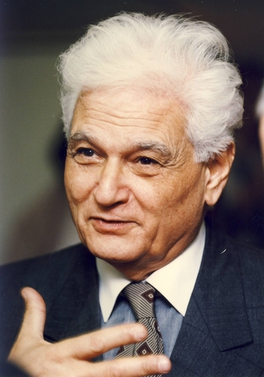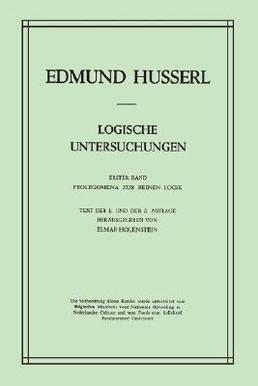
Edmund Gustav Albrecht Husserl was an Austrian-German philosopher and mathematician who established the school of phenomenology.

Jacques Derrida was a French philosopher. He developed the philosophy of deconstruction, which he utilized in a number of his texts, and which was developed through close readings of the linguistics of Ferdinand de Saussure and Husserlian and Heideggerian phenomenology. He is one of the major figures associated with post-structuralism and postmodern philosophy although he distanced himself from post-structuralism and disowned the word "postmodernity".

Hermeneutics is the theory and methodology of interpretation, especially the interpretation of biblical texts, wisdom literature, and philosophical texts. As necessary, hermeneutics may include the art of understanding and communication.

Phenomenology is the philosophical study of objectivity and reality as subjectively lived and experienced. It seeks to investigate the universal features of consciousness while avoiding assumptions about the external world, aiming to describe phenomena as they appear to the subject, and to explore the meaning and significance of the lived experiences.
Continental philosophy is an umbrella term for philosophies prominent in continental Europe. Michael E. Rosen has ventured to identify common themes that typically characterize continental philosophy. These themes proposed by Rosen derive from a broadly Kantian thesis that knowledge, experience, and reality are bound and shaped by conditions best understood through philosophical reflection rather than exclusively empirical inquiry.
John David Caputo is an American philosopher who is the Thomas J. Watson Professor of Religion Emeritus at Syracuse University and the David R. Cook Professor of Philosophy Emeritus at Villanova University. Caputo is a major figure associated with postmodern Christianity and continental philosophy of religion, as well as the founder of the theological movement known as weak theology. Much of Caputo's work focuses on hermeneutics, phenomenology, deconstruction, and theology.

Being and Time is the 1927 magnum opus of German philosopher Martin Heidegger and a key document of existentialism. Being and Time is among the most influential texts of 20th century philosophy. It had a notable impact on subsequent philosophy, literary theory and many other fields. Though controversial, its stature in intellectual history has been compared with works by Kant and Hegel. The book attempts to revive ontology through an analysis of Dasein, or "being-in-the-world." It is also noted for an array of neologisms and complex language, as well as an extended treatment of "authenticity" as a means to grasp and confront the unique and finite possibilities of the individual.
Contemporary philosophy is the present period in the history of Western philosophy beginning at the early 20th century with the increasing professionalization of the discipline and the rise of analytic and continental philosophy.
Existential phenomenology encompasses a wide range of thinkers who take up the view that philosophy must begin from experience like phenomenology, but argues for the temporality of personal existence as the framework for analysis of the human condition.

Simon Critchley is an English philosopher and the Hans Jonas Professor of Philosophy at the New School for Social Research in New York, USA.
Robert L. Bernasconi is Edwin Erle Sparks Professor of Philosophy at Pennsylvania State University. He is known as a reader of Martin Heidegger and Emmanuel Levinas, and for his work on the concept of race. He has also written on the history of philosophy.
Espen Hammer is Professor of Philosophy at Temple University. Focusing on modern European thought from Kant and Hegel to Adorno and Heidegger, Hammer’s research includes critical theory, Wittgenstein and ordinary language philosophy, phenomenology, German idealism, social and political theory, and aesthetics. He has also written widely on the philosophy of literature and taken a special interest in the question of temporality.
John Russon is a Canadian philosopher, working primarily in the tradition of Continental Philosophy. In 2006, he was named Presidential Distinguished Professor at the University of Guelph, and in 2011 he was the Shastri Indo-Canadian Institute's Canadian Lecturer to India.
David Edward Cooper is a British philosopher and writer. He is Emeritus Professor of Philosophy at Durham University.
Dermot Moran is an Irish philosopher specialising in phenomenology and in medieval philosophy, and he is also active in the dialogue between analytic and continental philosophy. He is currently the inaugural holder of the Joseph Chair in Catholic Philosophy at Boston College. He is a member of the Royal Irish Academy and a founding editor of the International Journal of Philosophical Studies.

The Logical Investigations is a two-volume work by the philosopher Edmund Husserl, in which the author discusses the philosophy of logic and criticizes psychologism, the view that logic is based on psychology.
The following is a bibliography of John D. Caputo's works. Caputo is an American philosopher closely associated with postmodern Christianity.
John Llewelyn was a Welsh-born British philosopher whose extensive body of work, published over a period of more than forty years, spans the divide between Analytical and Continental schools of contemporary thought. He has conjoined the rigorous approach to matters of meaning and logic typical of the former and the depth and range of reference typical of the latter in a constructive and critical engagement with the work of Jacques Derrida and Emmanuel Levinas.

The Center for Subjectivity Research (CFS) is an interdisciplinary research center at the University of Copenhagen, directed by Dan Zahavi. They work on a number of different topics: subjectivity, intentionality, empathy, action, perception, embodiment, naturalism, self-consciousness, self-disorders, schizophrenia, autism, cerebral palsy, normativity, anxiety, and trust, and do scholarly work on classical thinkers such as Kant, Hegel, Kierkegaard, Brentano, Husserl, Heidegger, Wittgenstein, Merleau-Ponty, Levinas, and Ricoeur. They put a variety of philosophical and empirical perspectives on subjectivity into play to obtain mutual enlightenment, and methodological and conceptual pluralism. Hence, they have had collaborations within different disciplines such as phenomenology, analytic philosophy, hermeneutics, psychiatry, neuroscience, philosophy of religion, Asian philosophy, developmental psychology, clinical psychology, and cognitive science.







